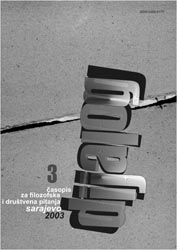INTELEKTUALNA TIRANO/PHILIA
INTELLECTUAL TYRANNO/PHILIA
Author(s): Abdulah ŠarčevićSubject(s): Philosophy
Published by: Akademija Nauka i Umjetnosti Bosne i Hercegovine
Summary/Abstract: The practices of tyranny are evidence of the extent to which “unfeeling intellectual rationalism,” which has repeatedly offended everyone, perverted everything, and ridden roughshod over everything that stood in its way, is responsible for these practices. The role of the idolized nation, a flawed concept of nation or people, blood and soil; hysterical and obsessive thinking on the categories of “nation” or “race,” the deification of revolutionary forces on the part of highly significant philosophers and intellectuals, and of their epigones among us, was later to be helped by ghouls, the cult of personality, “orgiastic mass assemblies” – all of these are features of the barbarism of our civilization. It is plain to see that “reason under pressure” collaborated, under the pressure of irrational passions transferred from religion to politics. The polarization of intellectuals began long ago. From the Dreyfus affair to the Russian Revolution, to Sartre’s existential Marxism, which was the romanticism of engagement, to Raymond Aron and his 1955 Opium of the Intellectuals, the quest for a world view. We reflect on how incompetent and naïve as a class modern intellectuals have been at various times. Aron has in mind the responsibility of intellectuals, European intellectuals, after World War II, who brought experience and competence, along liberal democratic political lines, who were competent – particularly in France and Germany – to reflect on moral issues, the sense of moral proportion in forming judgments on the “relative injustice of various political systems.” Sartre and his like-minded associates accepted responsibility for social and political processes not only in France but also in Europe as a whole. To this day, German historians are trying to understand the reasons for the absence of political commitment in Germany. These lie in history and culture, in tradition, with their related tradition of political decentralization, the absence of a cultural capital, the ideal of spiritual “interiority,” the autonomy of the university system, innate conservatism, respect for military authority. In France, as in the USA today, the issue of political commitment is not posed in the same way. We are concerned to feel ourselves as “inner,” that we are occupied with science for eternity, that in producing their works writers follow their own “education,” that only journalists dare to write about politics – this brings to mind the situation in Germany after World War I. What is at stake here is mythos. In Betrachtungen eines Unpolitischen (1918) Thomas Mann attacks the pretensions of French “literati of civilization” and their infantile propensity for democracy and the enlightenment of the people. This is a kind of monstrous love that strangles what it embraces. Thomas Mann, and later Adorno and Horkheimer, defend the tradition of German “interiority,” which Sören Kierkegaard, that wistful Dane, exalted.
Journal: Dijalog - Časopis za filozofiju i društvenu teoriju
- Issue Year: 2003
- Issue No: 03
- Page Range: 9-24
- Page Count: 16
- Language: Bosnian

